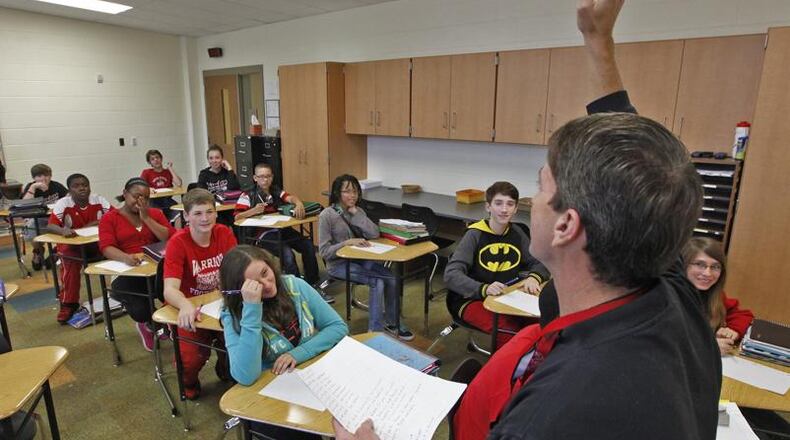A version of Substitute Senate Bill 216 has already passed the Senate, but it has been amended in the House, and House Education Committee Chair Andrew Brenner said more amendments are coming today.
RELATED: State board, proposed law seek changes to school report card
“We’ve had amendments that we were looking to put in other bills, but given the time frame that we have now … I’m under the assumption that we need to get this bill out by tomorrow if we’re going to have any intent to get it to the floor before we go on (summer/fall) break,” Brenner said.
Brenner said Tuesday that a few elements from Rep. Mike Duffey’s school report card reform bill could be folded into SB 216, adding that those details were not finalized at 6 p.m. Tuesday. The House Education Committee is scheduled to meet at 9:30 a.m. today.
Brenner said the main goal of the bill is to give school systems more flexibility. That echoed testimony last week from the bill’s sponsor, Sen. Matt Huffman.
RELATED: Senator: Ohio’s softer graduation rules not likely to be extended
“Over the past few years, I continually heard complaints from teachers, principals, and superintendents about how much time they wasted every day filling out insurmountable paperwork and complying with redundant mandates,” Huffman said in prepared testimony. “All too often what sounds like a good idea in Columbus transforms instead to … tedious tasks that distract teachers and superintendents from their primary role in our schools — educating.”
The Ohio Education Association, the state’s largest teachers union, supported some pieces of the bill, including the teacher evaluation changes, but said it opposed the overall package, largely over concerns about making teacher licensure less strict.
“Of primary concern are provisions OEA views as diluting or eliminating safeguards in teacher licensure that are designed to ensure the professionalism and preparedness of educators serving students in the classroom,” OEA said in earlier Senate testimony.
EDUCATION: Dayton schools approve raises, oust principal despite outcry
Tom Ash, Director of Governmental Relations for the Buckeye Association of School Administrators, argued that those issues can be best handled at the local level, through the collective bargaining process.
“I refer to this as the increase in local control and flexibility bill,” Ash said, saying it would help schools with staffing problems. “Teachers would be able to teach out of their areas of licensure for up to two years on either side. … If you’ve got a teacher licensed to teach English language arts and reading grades 4 through 9, and you needed someone to teach third grade reading, they could do it.”
According to Ohio’s Legislative Service Commission, current elements of the bill include:
** Evaluations: Changes teacher evaluations based on recommendations of the state's Educator Standards Board, while eliminating the 50 percent focus on student academic growth, as well as the measures for "student learning objectives" and "shared attribution."
RELATED: Dayton teachers union calls sting video “gross misrepresentation”
** Licensure: Allows schools to temporarily employ a licensed teacher to teach a subject or grade level for which they are not licensed. Creates new license systems for career tech educators and substitute teachers, and provides more flexibility in how subs can be used. Repeals requirements that teachers of core subject areas be designated as "highly qualified," and ends a requirement that core-subject teachers with low evaluations or poor school ratings take exams to prove their knowledge.
** Testing: Permitting schools to give third-, fourth- and fifth-graders their state tests either online or on paper. Requiring the state to request from test vendors an explanation of how state test questions are aligned to content standards.
** College Credit Plus: Except for certain low-income students, requiring College Credit Plus students to pay half of their textbook costs, which are currently covered by the schools. Also requiring the state to study the effectiveness of the CCP program.
** Other: Most nonteaching school employees would not be eligible for tenure until 6-7 years, rather than 2-3 years. Requires a review of the state's kindergarten readiness assessment, and tweaks requirements for reading improvement plans for young students. Specifies that the rules on "excessively absent" students should stop including excused absences.
About the Author

